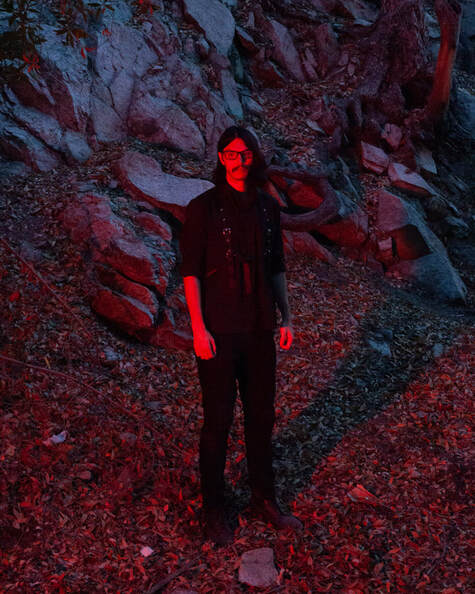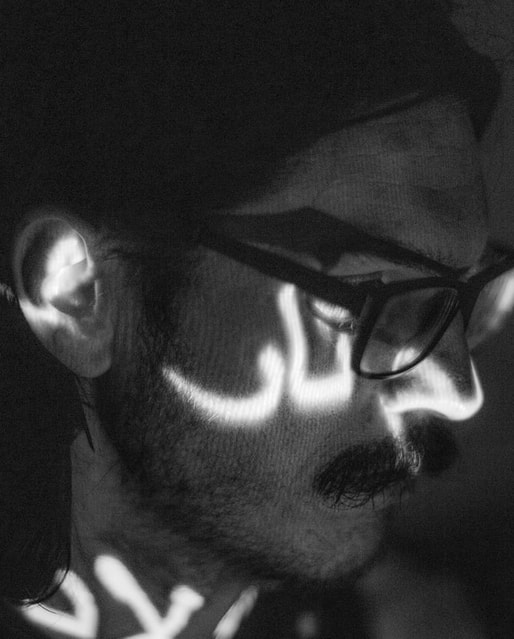
Big Blind Interview
Q: Can you talk about your history as a band?
A: Well, it's more of a solo project than a band. I started writing BB songs back in 2017. At that time, I was playing in a post-hardcore band called TUFON. Although I loved that music (and still do), I wanted to try something different. I started using Logic to make beats that incorporated both my Middle Eastern and Industrial influences.
Eventually, I got five songs together and decided to release it as an EP (Besa). My good friend Jason Lowrie did the mixing and vocal production on it. He's a truly great musician and producer. After that, I put together a band with my friends and played some shows. Like many people, we had a bunch of shows booked for 2020 that were canceled. I've been working on the next record for the past year and a half.
Q: What is your recording process like?
A: It's kind of all over the place. Because most of my songs have synths and drum samples, I only really need to record the vocals and guitar. My friend Rye Randa has been letting me use his garage-studio for recording throughout the pandemic. He's an amazing musician, and I'm really grateful for his help.
For guitars, I do a mix of DI (direct input) and live recordings. For big power chords, I try to record live as much as possible. They just hit harder that way. My friend Josh Franks has a studio in Burbank, and he knows how to get a great tone out of his amps. For lead parts, I tend to just do a DI track. Although I love playing guitar, I'm not one of those people that has a massive pedalboard. I keep the tone pretty simple, and if I need something more eccentric, I try to find a plug-in for it.
Q: What is your creative process like?
A: A song can start from a beat, a vocal melody, a guitar riff, a synth sound, etc. I'm constantly recording little things on my phone to revisit later.
Generally, though, one idea comes to me, and then it's followed up with more ideas. I try not to force anything. I never sit down and say, "today, I'm going to write a song." I have to let it happen on its own. This is especially true for lyrics. I might have the instrumentals done for months before I finalize the words.
Q: Can you talk about your history as a band?
A: Well, it's more of a solo project than a band. I started writing BB songs back in 2017. At that time, I was playing in a post-hardcore band called TUFON. Although I loved that music (and still do), I wanted to try something different. I started using Logic to make beats that incorporated both my Middle Eastern and Industrial influences.
Eventually, I got five songs together and decided to release it as an EP (Besa). My good friend Jason Lowrie did the mixing and vocal production on it. He's a truly great musician and producer. After that, I put together a band with my friends and played some shows. Like many people, we had a bunch of shows booked for 2020 that were canceled. I've been working on the next record for the past year and a half.
Q: What is your recording process like?
A: It's kind of all over the place. Because most of my songs have synths and drum samples, I only really need to record the vocals and guitar. My friend Rye Randa has been letting me use his garage-studio for recording throughout the pandemic. He's an amazing musician, and I'm really grateful for his help.
For guitars, I do a mix of DI (direct input) and live recordings. For big power chords, I try to record live as much as possible. They just hit harder that way. My friend Josh Franks has a studio in Burbank, and he knows how to get a great tone out of his amps. For lead parts, I tend to just do a DI track. Although I love playing guitar, I'm not one of those people that has a massive pedalboard. I keep the tone pretty simple, and if I need something more eccentric, I try to find a plug-in for it.
Q: What is your creative process like?
A: A song can start from a beat, a vocal melody, a guitar riff, a synth sound, etc. I'm constantly recording little things on my phone to revisit later.
Generally, though, one idea comes to me, and then it's followed up with more ideas. I try not to force anything. I never sit down and say, "today, I'm going to write a song." I have to let it happen on its own. This is especially true for lyrics. I might have the instrumentals done for months before I finalize the words.
Q: What are some of the themes that are touched upon on your new EP scheduled for later this year?
A: I think that, from a thematic perspective, the new EP is both political and personal at the same time. I guess the best way I could explain it is that these new songs are an attempt at connecting my own experiences to macro-level issues that are affecting the country and world at large. Everything from capitalism and consumerism to addiction and body dysmorphia plays a role.
My dad committed suicide when I was 20 years old. I wasn't able to write about it in the past, but some of the new songs tap into it. I've also been exploring intergenerational trauma and epigenetics. My great-great-grandfather was a well-known Iranian nationalist named Seqat-ol-Eslam Tabrizi. He was executed by the Russians in 1911. Learning about these things gives me perspective on my own life and inspires me in the writing process.
Q: Have you played any of the material live or perhaps virtually?
A: I have played a few new songs on my Instagram account, but they have not been performed with a full band yet. I'm currently in the process of moving to New York, so I have to form a new band once I get over there.
I want a lot of improvisation in the live shows. I am on the lookout for a versatile drummer and some world percussionists. The new record features some middle eastern instruments, such as zurna and duduk, so I would like to find someone that can play those as well.
Q: What else should we know about your music?
A: When I was a kid, I listened to a lot of Nirvana and Smashing Pumpkins. Then I got into stuff that was more progressive and mathematical. Then I got into hardcore and post-hardcore music. Then came industrial and darkwave stuff.
Nowadays, I really just appreciate new production techniques. The palette of sounds available has never been as big as it is today. I'm constantly trying to improve my skills as a producer while also incorporating a healthy amount of guitar. My good friend Nathan Salon is doing the mixing on the new record, and he has really helped me achieve the sound that I'm going for. He's fantastic at what he does.
While most of my lyrics are in English, there is a bit of Farsi as well. Although I speak the language, my poetry skills are not that great. I enlisted the aid of my friend Sajad Iranpour to help me learn how to write poems properly. He is a true expert on Persian poetry and literature.
A: I think that, from a thematic perspective, the new EP is both political and personal at the same time. I guess the best way I could explain it is that these new songs are an attempt at connecting my own experiences to macro-level issues that are affecting the country and world at large. Everything from capitalism and consumerism to addiction and body dysmorphia plays a role.
My dad committed suicide when I was 20 years old. I wasn't able to write about it in the past, but some of the new songs tap into it. I've also been exploring intergenerational trauma and epigenetics. My great-great-grandfather was a well-known Iranian nationalist named Seqat-ol-Eslam Tabrizi. He was executed by the Russians in 1911. Learning about these things gives me perspective on my own life and inspires me in the writing process.
Q: Have you played any of the material live or perhaps virtually?
A: I have played a few new songs on my Instagram account, but they have not been performed with a full band yet. I'm currently in the process of moving to New York, so I have to form a new band once I get over there.
I want a lot of improvisation in the live shows. I am on the lookout for a versatile drummer and some world percussionists. The new record features some middle eastern instruments, such as zurna and duduk, so I would like to find someone that can play those as well.
Q: What else should we know about your music?
A: When I was a kid, I listened to a lot of Nirvana and Smashing Pumpkins. Then I got into stuff that was more progressive and mathematical. Then I got into hardcore and post-hardcore music. Then came industrial and darkwave stuff.
Nowadays, I really just appreciate new production techniques. The palette of sounds available has never been as big as it is today. I'm constantly trying to improve my skills as a producer while also incorporating a healthy amount of guitar. My good friend Nathan Salon is doing the mixing on the new record, and he has really helped me achieve the sound that I'm going for. He's fantastic at what he does.
While most of my lyrics are in English, there is a bit of Farsi as well. Although I speak the language, my poetry skills are not that great. I enlisted the aid of my friend Sajad Iranpour to help me learn how to write poems properly. He is a true expert on Persian poetry and literature.

